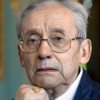Paul Ricoeur

Paul Ricoeur
Jean Paul Gustave Ricœurwas a French philosopher best known for combining phenomenological description with hermeneutics. As such, his thought is within the same tradition as other major hermeneutic phenomenologists, Martin Heidegger and Hans-Georg Gadamer. In 2000, he was awarded the Kyoto Prize in Arts and Philosophy for having "revolutionized the methods of hermeneutic phenomenology, expanding the study of textual interpretation to include the broad yet concrete domains of mythology, biblical exegesis, psychoanalysis, theory of metaphor, and narrative theory."...
NationalityFrench
ProfessionPhilosopher
Date of Birth27 February 1913
CountryFrance
Beyond the desert of criticism, we wish to be called again.
First, it is not unimportant that the legislative texts of the Old Testament are placed in the mouth of Moses and within the narrative framework of the sojourn at Sinai.
But myth is something else than an explanation of the world, of history, and of destiny. Myth expresses in terms of the world - that is, of the other world or the second world - the understanding that man has of himself in relation to the foundation and the limit of his existence. Hence to demythologize is to interpret myth, that is, to relate the objective representations of the myth to the self-understanding which is both shown and concealed in it.
Testimony gives something to be interpreted.
Testimony demands to be interpreted because of the dialectic of meaning and event that traverses it
Wisdom finds its literary expression in wisdom literature.
The logic of validation allows us to move between the two limits of dogmatism and skepticism.
Although there has always been a hermeneutic problem in Christianity, the hermeneutic question today seems to us a new one.
The dictionary contains no metaphors.
There is no shorter path for joining a neutral existential anthropology, according to philosophy, with the existential decision before God, according to the Bible.
The spectacle is at the same time the mirage of self in the mirror of things.
To put it in a few words, the true malice of man appears only in the state and in the church, as institutions of gathering together, of recapitulation, of totalization.
If you want to change people's obedience then you must change their imagination.
We are not capable of producing a concept of time that is at once cosmological, biological, historical and individual